Interview with Umran Beba, PepsiCo
“Developing a global mindset means being open to diversity across cultures and markets.”
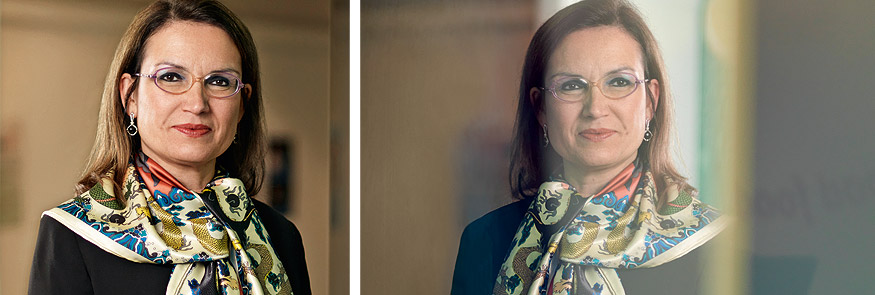
For many years Umran Beba, President Asia-Pacific, PepsiCo, has advocated increasing the number of women in management positions – and has gotten results. In an interview with THE FOCUS she describes how she uses PepsiCo’s D&I agenda to reach her goals and why even strong women need sponsors.
The Focus: Ms. Beba, today PepsiCo is considered a pioneer in the field of diversity and inclusion (D&I). Is there a deliberate strategy behind this? Did it result from a conscious decision on the part of the company leadership?
Umran Beba: A series of informed and deliberate decisions brought us to this point, a process that started long before I joined the company. Today diversity and inclusion are part of PepsiCo’s DNA, but the journey that brought us here started in the 1950s when the company elected its first woman board member, actress Joan Crawford. That was a real rarity in the corporate world of that era. And it was just the beginning. PepsiCo was the first company to hire African-American professionals, the first to engage in multicultural marketing and the first to link executive bonuses to individual D&I performance.
The Focus: When a global player like PepsiCo pays intense and sustained attention to diversity issues, surely its sole motivation isn’t a desire for equal opportunity, fairness, and a good image. Why does your company place such a priority on D&I?
Beba: We are committed to diversity because it gives us a competitive advantage and can drive innovation and growth. As an international producer of consumer goods, foods, and beverages, our customer base is very diverse. It is of vital importance that this base is represented in our workforce.
The Focus: As PepsiCo’s Asia-Pacific President, do you place particular emphasis on certain D&I activities within your sphere of responsibility?
Beba: In our company the definition of diversity is actually quite broad. But in our region we have decided to focus on gender, as we already have cultural diversity, with 21 nationalities represented in the PepsiCo Asia Pacific associate base.
The Focus: Which certainly seems to be the obvious choice for a woman in a top executive position. That said, you are probably motivated by more than just female solidarity. Why then is gender at the top of your diversity agenda?
Beba: There are indeed a number of solid economic and demographic reasons behind my decision. For the most part Asia-Pacific consists of emerging markets, in which we face an alarming scarcity of talent. The education and professional development of talented young people is not keeping pace with the rapid economic growth of the region. When we do the math, it becomes obvious that we can’t afford to ignore half of the talent pool – namely the female half. We’ve just now reached 37 percent female representa tion at the decision-making level; all levels taken together are very nearly the same at 34 percent. We are proud of reaching this target – a minimum of one-third female representation in our organization – but I really do look at this number as a minimum. One-third is a critical percentage in board representation, as well as in executive, decision-making roles. But ideally, I’d like to see 50 percent women at all levels of an organization, because women represent 70 percent of our shoppers.
The Focus: Are there serious differences between the various countries of the region? Where is it particularly easy or difficult to advance gender diversity?
Beba: We have received a lot of attention and recognition for our initiatives and are certainly ahead of many of our competitors and other organizations. But if we want to know where we really stand, we must assess our performance in relation to individual labor markets. We have 21 nationalities in the region and we operate in 28 markets. Each market has its own unique cultural characteristics, both in society as a whole and within corporations. In terms of female representation, we can divide the Asia-Pacific region into three large sectors. Japan and Korea are the most challenging markets when it comes to attracting and retaining women. Australia and Pakistan are representative of a group of markets in the middle. In Thailand, Vietnam, the Philippines, and Malaysia female talent is more available and retention, after life events, is much easier.
The Focus: Before you were appointed to your current position, for 16 years your scope of responsibility at PepsiCo included Turkey, your home country. In the past two years, Forbes magazine recognized PepsiCo Turkey as the company in which women have the best opportunities for advancement. Fifty-three percent of the management is made up of women. That is certainly remarkable in a country that has not been widely considered a model of equal opportunity for women. Didn’t you find it frustrating when you had to start again from scratch here two years ago?
Beba: No, not at all. The improvement in the region from 26 percent in February 2010 to 37 percent female representation is very satisfying. Satisfying in the sense that the journey really can and does continue. In my mind, it will always be a journey. You do have to understand that Turkey is a single country, however, and measuring results in a single country is always easier than across an entire region. Asia-Pacific has diverse nationalities and cultures and differing dynamics of female representation. Successes in Thailand, Malaysia, the Philippines, and Vietnam have to be balanced against countries where we may see fewer positive results, such as Australia, Pakistan, Japan, and Korea. But with the right initiatives, we can accomplish a lot in those countries as well.
The Focus: What makes you so optimistic?
Beba: My many years of experience at PepsiCo. When it comes to gender diversity our company has advanced in stages. In the USA one significant step came in 2000, followed by a move to the international stage in 2004. At that time I was in charge of the East Mediterranean region – the markets of Turkey, Jordan, Lebanon, Syria, and Iraq – and we were reporting to the Middle East-Africa region. So I was going from Turkey, where we were best in class, to Middle East-Africa, a region that was nearly its opposite with total female representation of five percent. At the time I was really shocked by that figure. After many initiatives, we managed to get up to 20 percent in the region.
The Focus: How did you accomplish that?
Beba: I was personally driving the agenda, with support from my peers, managers, and the business. We started by developing task forces and quantitative and qualitative surveys, and getting leadership support from my colleagues as well as our manager in Middle East-Africa. I can’t overemphasize the importance of securing the sponsorship of the top executive and the leadership team for the agenda.
The Focus: What are the individual points on the agenda?
Beba: We have identified four areas to concentrate and work on. The first is work-life balance. Second is culture, which we define very broadly. Then comes professional development, and fourth is communication. Flexibility is the key to a better work-life balance. We tested a lot of arrangements like flexible hours, part-time positions, telecommuting, and working from a different location. And we invite the women themselves to tell their supervisors the “One Simple Thing” that would significantly improve their work-life quality. We rolled out all these instruments, even where the environment was very challenging, as in Pakistan or Dubai. And the results were encouraging. Today we have a multitude of flexible arrangements across PepsiCo that can be applied as needed and adapted to local and individual needs. We also help with child care and have programs to maintain contact with employees on maternity leave.
The Focus: And these arrangements are then adapted to suit the culture in question?
Beba: Yes, although we use a very broad definition of culture – it could be the country’s culture, the culture of the company, and even the culture of the manager in charge. In fact, culture is probably the single most challenging element driving the diversity agenda. You have to set targets, which is done at the top leadership level. So sponsorship for gender diversity at that level is indispensable. Continuous training, awareness building, coaching and mentoring are the best ways to improve the environment and advance the agenda. In some policy areas such as hiring, targets are crucial. Today we insist on diverse slates and candidates before we make a final decision. We are not satisfied if there is only one gender represented in our candidate pool. Ideally we want to see a 50:50 gender ratio, but the candidate pool should have at least one female candidate. With regard to promotions, we also want to see diverse slates and make a decision based on the best performance, the best fit.
“Sponsoring women means supporting them in building the 3 Cs – confidence, courage, and care.”
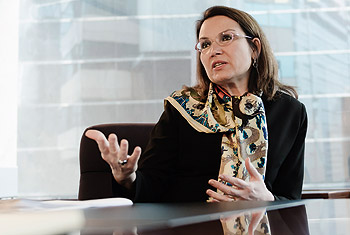
The Focus: You mentioned coaching and mentoring as important ways to improve the environment for gender diversity…
Beba: For covering all those areas that are relevant to our diversity and inclusion goals, I would say that mentoring is the best answer, as opposed to approaching each female employee with specific training programs. Today we take it a step further – the discussion has recently turned towards sponsorship. While a mentor stays in the background and serves in an advisory role, sponsors are more active on behalf of the employee. Sponsors are typically at the most senior levels, capable of forging connections and influencing career development. But we view mentoring as an excellent starting point for sponsorship of women, supporting them in building what we call the 3 Cs – confidence, courage and care. We need mentors and sponsors not only for women, but for associates throughout our organization, to encourage them to take on different and challenging roles. I see mentoring and sponsorship as great ways to develop talent and help break through the infamous glass ceiling.
The Focus: You named professional development as the third important point on the D&I agenda. Have you initiated specific programs for women?
Beba: Yes, we have applied a couple in our region. One is a web-based program for women which helps them master the challenges involved in managing the balance between career and personal life. It is called “Powerful Woman Program” by Geraldine Bown. The other is the Authentic Woman Leadership program.
The Focus: What does “authentic” mean in this context?
Beba: We want our female employees – and not only them, but everyone – to bring their authentic selves to the workplace, because otherwise the positive impacts of diversity will never be felt. As I see it, women in particular need to have this message reinforced. They often believe that they have to mimic male behavior patterns to get ahead in their careers. But this is precisely what we don’t want.
"We really want our female employees, and not only them but everyone, to bring their authentic selves to the workplace.”
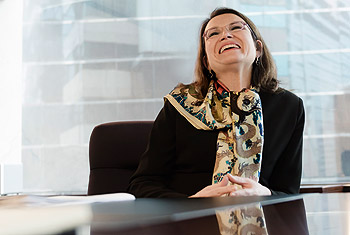
The Focus: That brings us to the last point of the diversity agenda, communication…
Beba: Yes, internal and external communication are important to conveying our mindset and our goals. Internal communication creates awareness, keeps issues in the spotlight, and makes sure that available policies and programs are being applied in the workforce. In addition, we employ communication to circulate best practice examples throughout the corporation. External communication is used to share lessons learned with other companies and to attract talent through our workplace practices.
The Focus: Have your diversity and inclusion programs made PepsiCo a more attractive employer in your various markets?
Beba: Definitely. Again, this is a journey, and we can’t say that we have arrived at the ideal destination yet. But one of the best ways to attract talent is to communicate our approach, especially through our employees talking about their experiences. Our people, who have internalized their experiences, volunteer to share their stories in different settings. They are our best ambassadors.
The Focus: Can you actually gauge the value these programs have brought to the organization? Do you measure this?
Beba: It certainly isn’t easy. Our traditional performance metrics address business and people results. I think the benefits and improvements of diversity mainly flow from alignment with the marketplace and the customer base. Measuring female representation by the numbers, for example, is an easy and visible way to track our diversity efforts. But the invisible part of the equation is: “How do we work together?” With 21 nationalities in both emerging and developing markets, it becomes extremely important that we understand each other. And we have a lot of partners in this part of the world as well. Today, you cannot just look at the numbers. You have to take care of your customers, the environment, and organizational talent – all in a global context. It’s a multi-stakeholder world, and it’s becoming increasingly complex. The shift to knowledge-intensive industries highlights the importance as well as the scarcity of well-trained talent. At the same time, the increasing integration of global labor markets opens up new talent sources. And with its many emerging markets, the Asia region plays a very important role in developing talent for the global market.
The Focus: At the beginning of our conversation, you mentioned that you link executive bonuses to individual D&I performance…
Beba: That’s right. On the people side of our performance system, one section is called “having a diverse and inclusive environment.” Diverse means having the right diversity balance – which can mean gender as well as the employment of local talent. Having an inclusive work environment is the other part. We evaluate both aspects, which ensures that our D&I objectives are taken seriously by all our executives throughout the corporation. That is actually measured continuously in our organizational health surveys and used as a key performance indicator – not to mention in our 360-degree feedback surveys for management.
The Focus: With regard to targets and driving the agenda – is the executive team in the region on board with these targets? Do the leaders share the same vision in both mature and emerging markets?
Beba: Our success in the region is mainly driven by my team. But I can only sponsor the agenda. Voice it, support it. In the end, I can’t drive it case-by-case. The general managers need to understand the importance of the agenda and take action. They have to make sure they see diverse slates and diverse candidates, and consider them in promotions. So here success belongs to the teams. But we do see a lot of buy-in from our general manager teams – even in challenging markets like Pakistan. There, for example, we have a child-care center, a safe environment where women are close to their children. This helps attract more female talent. The general managers are on board during the selection process, and then later, supporting and mentoring women continuously in those challenging environments to make sure they succeed.
The Focus: Attracting talent is one side of the coin; the other is retention of female talent.
Beba: Yes, leakage occurs, but differently in different cultures and markets. Here again the best answer is coaching and mentoring, such as Senior-to-Junior programs – and not only by male executives. The big question for women is, “Can I succeed here?” Women need to see role models. They need to hear about basic experiences. To that end, we set up web pages so that women can share their experiences. And we encourage women’s networks where they can get together and discuss issues on a regular basis. Women can learn a lot from each other. As a company, if you can learn to drive this, it places you in a more competitive position. We are active in this area of networking, but I think we can do more in terms of social networking, both in the region and globally.
The Focus: Regarding the experience that talented people acquire in this region, how does that feedback flow up to PepsiCo’s headquarters?
Beba: Talented people from this region, or other parts of the world, take what they have learned and their understanding of the dynamics of this multi-market environment back to corporate headquarters or to their next position. Take my presence here, coming from Turkey. I am in this region to learn, to add value, to develop. Then, at some point when I move on to another role, I will take what I have learned in this emerging market area and my experience working with different cultures and partners with me to the next level.
“The most important characteristics to encourage are empathy, tolerance, patience, and respect.”
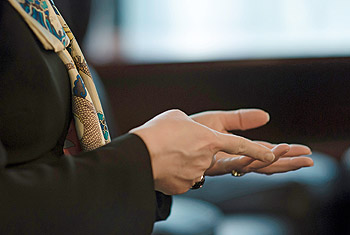
The Focus: When you move people around globally, what kind of integration support do you provide to help people learn to manage different cultural contexts?
Beba: Our inclusion training helps our people understand the dynamics of a region or a specific market – the history, the interaction between cultures, and the current values in the business world and in society. Training lasts for two or three days, so it functions more as an introduction. From my perspective, travel and spending time in other environments are very helpful. The most important characteristics to encourage are empathy, tolerance, patience and respect. This creates the right environment for a collaborative leadership style that is not only driven by results, but also by teamwork. Developing a global mindset means being open to diversity across cultures and markets, and finding the right balance between the demands of global and local elements.
The Focus: You spend a significant portion of your time participating in external forums, sharing the success story of PepsiCo’s strong inclusive culture. But for many companies in the region, this is still a new idea. Has your advocacy helped inspire other companies to do more in this area?
Beba: I think it may put pressure on their leadership. But also, as a woman committed to this agenda, I have to say that you can’t expect everything from the leaders. We have roles to play as individuals, sharing our own stories and trying to be role models for women. Sharing the message enlarges it and makes it more powerful so that you can attract other companies to drive toward the same goals. And it is not easy: both top-down and bottom-up dynamics are needed to arrive at a successful solution.
The Focus: How far do you think you have actually progressed towards achieving your diversity and inclusion goals, and what do you see as the main challenges ahead?
Beba: Progress in our region will slow down and become more incremental as we approach our ideal of 50 percent. In terms of retention, I think we have to develop more flexibility. In the UK, for instance, part-time senior women are much more common than in other parts of the world. There it is mainly driven by legislation. But in the absence of similar laws in other countries, we should still examine this interesting idea and see how we can apply it to other markets. For me there seems to be no end of new ideas. The journey continues.

The interview with Umran Beba in Hong Kong was conducted by Catherine Hongxia Zhu and Bill Henderson, Egon Zehnder, Hong Kong.
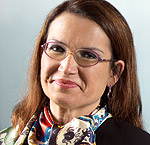
Umran Beba
Born in Turkey, Umran Beba was appointed PepsiCo’s President for Asia Pacific in February 2010. In this role, Beba is responsible for PepsiCo’s food and beverage businesses in more than 20 countries throughout the Asia-Pacific region. She has held a wide range of positions since joining the company in 1994. As an active champion of diversity and inclusion, Beba has been instrumental in leading PepsiCo’s female talent development efforts in many parts of the world, achieving considerable success. In Turkey the ratio of female executives on her management team was 53 percent. Beba holds an MBA and a BSc in industrial engineering from Bogaziçi University in Turkey. She is a board member of Calbee Group Japan, an advisory council member for the Switzerland-based Women International Network (WIN), and an advisory council member for Hong Kong University of Science and Technology Business School. She lives in Hong Kong with her husband, Professor Ali Beba, and their two sons.
PHOTOS: RED DESERT LTD





